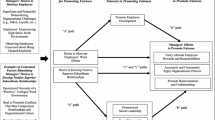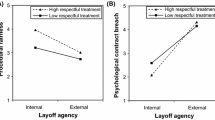Abstract
The present study identified the bipolar principles that workers use for evaluating the fairness of a broad range of negative organizational events. Two hundred forty-eight respondents were asked to describe recent negative events that occurred in their organizations, and explain the reasons for their fairness perceptions of the events. The responses were coded to yield 5 principles associated with outcome fairness and 8 principles associated with process fairness; this set included principles not found in earlier taxonomies. Support for previous justice models and needed areas of research are discussed.
Similar content being viewed by others
REFERENCES
Bies, R.J., & Moag, J.S. (1986). Interaction justice: Communication criteria of fairness. In R.J. Lewicki, B.H. Sheppard, & B.H. Bazerman (Eds.), Research on negotiation in organizations (Vol. 1, pp. 43-55). Greenwich, CT: JAI Press.
Bies, R.J., Shapiro, D.L., & Cummings, L.L. (1988). Voice and justification: Their influence on procedural fairness judgments. Academy of Management Journal 31, 676-685.
Brockner, J., DeWitt, R., Grover, S., & Reed, T. (1990). When it is especially important to explain why: Factors affecting the relationship between managers' explanations of a layoff and survivors' reactions to the layoff. Journal of Experimental Social Psychology 26, 389-407.
Brockner, J., Grover, S., Reed, R., DeWitt, R., & O'Malley, M. (1987). Survivors' reactions to layoffs: We get by with a little help from our friends. Administrative Science Quarterly 32, 526-542.
Brockner, J., Tyler, T.R., & Cooper-Schneider, R. (1992). The effects of prior commitment to an institution on reactions to perceived unfairness: The higher they are, the harder they fall. Administrative Science Quarterly, 37, 241-361.
Cascio, W. (1993). Downsizing: what do we know? What have we learned? Academy of Management Executive, 7(1), 95-104.
Deutsch, M. (1975). Equity, equality, and need: What determines which will be used as the basis for distributive justice? Journal of Social Issues, 31(3), 137-149.
Folger, R., & Konovsky, M.K. (1989). Effects of procedural and distributive justice on reactions to pay raise decisions. Academy of Management Journal, 32, 115-130.
Gilliland, S. (1993). The perceived fairness of selection systems: An organizational justice perspective. Academy of Management Review, 18, 694-734.
Goodman, P.S. (1974). An examination of referents used in the evaluation of pay. Organizational Behavior and Human Performance, 12, 170-195.
Greenberg, J. (1986). Determinants of perceived fairness of performance evaluations. Journal of Applied Psychology, 71, 340-342.
Greenberg, J. (1990). Organizational justice: Yesterday, today, and tomorrow. Journal of Management, 16, 399-432.
Greenberg, J. (1992). The social side of fairness: Interpersonal and informational classes of organizational justice. Symposium presented at the Seventh Annual Conference of the Society for Industrial/Organizational Psychology, Montreal, May, 1992.
Heenan, D. (1991). The right way to downsize. Jouranl of Business Strategy, Sept/Oct, 4-7.
Konovsky, M.A., & Cropanzano, R. (1991). The perceived fairness of employee drug testing as a predictor of employee attitudes and job performance. Journal of Applied Psychology, 76, 698-707.
Korsgaard, M.A., Goodwin, R. (1992). Procedural justice in performance evaluation: The role of voice through self-appraisal. Symposium presented at the Seventh Annual Conference of the Society for Industrial/Organizational Psychology, Montreal, May, 1992.
Kravitz, D.A., & Stone, E.F. (1992). Effects of appeal procedures on procedural justice criteria. Paper presented at the Seventh Annual Conference of the Society for Industrial/Organizational Psychology, Montreal.
Leung, K., Chiu, W., & Au, Y. (1993). Sympathy and support for industrial actions: A justice analysis. Journal of Applied Psychology, 78, 781-787.
Leventhal, G.S. (1976). The distribution of rewards and resources in groups and organizations. In L. Berkowitz & E. Walster (Eds.), Advances in experimental social psychology (Vol. 9, pp. 91-131). New York: Academic Press.
Leventhal, G.S. (1980). What should be done with equity theory? In K.J. Gergen, M.S. Greenberg, & R.H. Willis (Eds.), Social exchange: Advances in theory and research (pp. 27-55). New York: Plenum.
McFarlin, D.B., & Sweeney, P.D. (1992). Distributive and procedural justice as predictors of satisfaction with personal and organizational outcomes. Academy of Management Journal, 35, 626-637.
Moorman, R.H. (1991). Relationship between organizational justice and organizational citizenship behaviors: Do fairness perceptions influence employee citizenship? Journal of Applied Psychology, 76, 845-855.
Schneider, B., Wheeler, J.K., & Cox, J.F. (1992). A passion for service: Using content analysis to explicate service climate themes. Journal of Applied Psychology, 77(5), 705-716.
Sheppard, B.H., & Lewicki, R.J. (1987). Towards general principles of managerial fairness. Social Justice Research, 1, 161-176.
Sheppard, B.H., Lewicki, R.J., & Minton, R. (1992). Organizational justice. New York: Lexington Books.
Thibaut, J., & Walker, L. (1975). Procedural justice: A psychological analysis. Hillsdale, NJ: Lawrence Erlbaum Associates.
Tyler, T.R., & Bies, R.J. (1990). Beyond formal procedures: The interpersonal context of procedural justice. In J. Carroll (Ed.), Advances in applied social psychology: Business settings (pp. 77-98). Hillsdale, NJ: Lawrence Erlbaum Associates.
Weinstein, H., & Leibman, M. (1991). Corporate scale down: What comes next? HR Magazine, 33-37.
Author information
Authors and Affiliations
Rights and permissions
About this article
Cite this article
Simerson, G., L'Heureux, T., Beckstein, B. et al. What Principles Are Used to Judge the Fairness of Retrenchment Actions?. Journal of Business and Psychology 14, 443–457 (2000). https://doi.org/10.1023/A:1022980200502
Issue Date:
DOI: https://doi.org/10.1023/A:1022980200502




